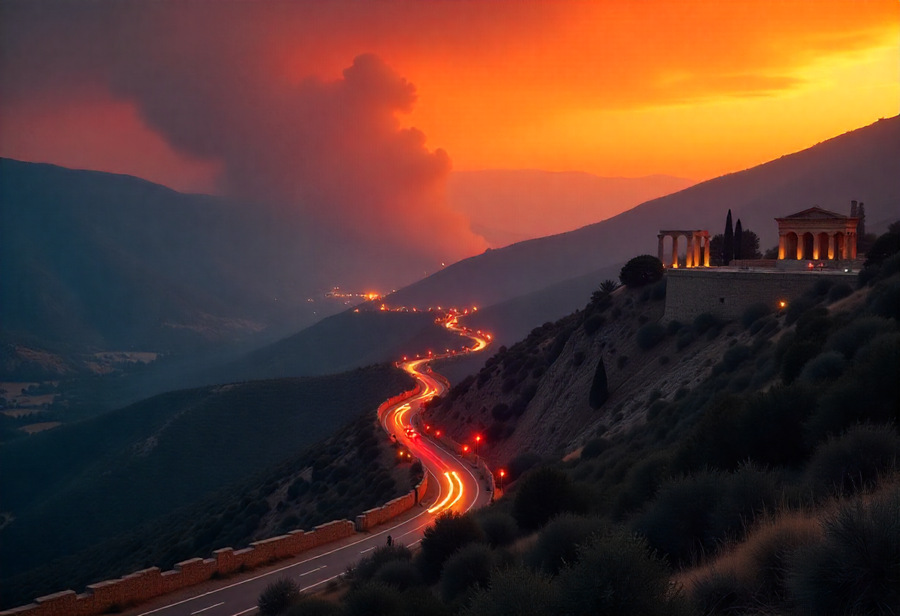Published on
August 9, 2025 |
A huge fire erupted in an area close to Keratea, south of Athens, triggering evacuations and interrupting life in the area. More than 200 firefighters, aided by 11 water bombers and seven helicopters, have been laboring day and night to bring the fire under control, with gusty winds fueling the flames. “The situation is very bad,” said Costas Tsigkas, president of the Greek firefighters’ officers association. “The strong winds make it hard for us to extinguish the fire.”.
A sad find was made when the firefighters discovered the remains of an elderly victim in their burnt house. Vassilis Vathrakogiannis, a fire service spokesman, commented further that the wind was preventing the water bombers from flying effectively, further delaying the efforts at firefighting.
Firefighters in Action as Destructive Flames Spread
Reports from Palaia Fokaia, a town located about 45 kilometers (28 miles) south of Athens, show the ferocity of the wildfire, as fire consumed a house and thick smoke filled the air. Firefighters were seen rushing to direct hoses at the flames, while a helicopter flew overhead to drop water. The intense conditions and limited visibility due to smoke created significant challenges for those working to contain the fire and protect residents.
In other parts of Greece, the situation showed some improvement, with a fire on the island of Cephalonia now under control, and firefighting operations easing in the Peloponnese peninsula.
Strong Winds Fuel Wildfire Spread and Disrupt Ferry Services
The Ministry of Civil Protection has warned that wind gusts in the region could reach speeds of 88 kilometers per hour, particularly in the southern Aegean and the Sea of Crete. The national weather service, EMY, predicted the winds would start to weaken after midnight. However, due to the heightened risk, several regions, including the Attica area around Athens, were placed on the highest alert for wildfires.
Strong winds have also created challenges for ferry services, which are crucial for island connections in Greece. The gales have led to ferry cancellations and delays, particularly to the Cyclades and Dodecanese islands, severely affecting the tourism sector. The coastguard reported that ferries could not depart as scheduled from Piraeus or other Athens ports.
At the Piraeus port, travelers faced long queues and intense frustration, as hundreds waited for information about delayed or cancelled departures. Philip Elias, an American tourist, described the situation as chaotic, with people surrounded by their luggage, trying to rearrange their travel plans amid the uncertainty.
Tragic Losses Amid the Crisis
In a separate tragic incident, the coastguard reported the deaths of two individuals—a Vietnamese man and woman—who were found unconscious at Sarakiniko beach on the island of Milos in the Cyclades. The woman had fallen into the water, and the man attempted to save her but tragically drowned in the process.
Widespread Fire Damage Across Greece
This year, Greece has already faced multiple major wildfires, including on the islands of Evia and Chios, and in the western Peloponnese. The combination of extreme heat, windy conditions, and drought has created ideal conditions for fires to spread quickly, affecting both residential areas and agricultural lands.
While Greece’s firefighting capabilities have been stretched to their limits, the ongoing battle against these fires highlights the need for long-term strategies to deal with wildfires, including improved resources, prevention measures, and more efficient evacuation plans for those in danger.
A Wake-Up Call for Tourism and Infrastructure
The wildfires and the subsequent travel disruptions have served as a wake-up call for the Greek government and tourism industry. The delays in ferry services and the uncertainty surrounding airport operations remind everyone of the vulnerabilities of Greece’s tourism infrastructure in the face of natural disasters.
The coastal regions, which are often the most popular destinations for international tourists, will need to consider sustainable tourism strategies that take into account the environmental risks posed by such extreme events. This could include more disaster-resilient infrastructure for visitors and the implementation of early warning systems to mitigate the impact of future wildfires.
Looking Ahead: Addressing Climate Change and Wildfire Risks
While Greece battles wildfires and navigates the challenges of an ongoing tourism crisis, the long-term solution to such recurrent problems may lie in addressing the underlying issue: climate change. The increased frequency and severity of wildfires in Greece and the wider Mediterranean region underscore the importance of climate adaptation strategies, both in terms of fire prevention and tourism management.
A Call for Resilience and Recovery in Greece
The Greek wildfire situation unfolding currently, along with the loss of lives and the disruption caused in traveling, presents a strong reason for enhanced preparedness, climate-resilient policies, and tourism and public safety innovation. While the developments continue to unfold, the emphasis is on proper response actions, public outreach, and all-round efforts to protect the nation’s people and essential infrastructure.
